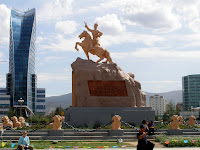 Mix up the vast landscapes of the Gobi, the snowcapped mountains of Bayan-Ölgi and the dramatic gorges and sparkling lakes of Khövsgöl. Sprinkle in the felt homes of the nomad and the cry of an eagle.Add Buddhist temples, mysterious ruins, abundant wildlife and legendary hospitality. Then top it all off with a conqueror who started
Mix up the vast landscapes of the Gobi, the snowcapped mountains of Bayan-Ölgi and the dramatic gorges and sparkling lakes of Khövsgöl. Sprinkle in the felt homes of the nomad and the cry of an eagle.Add Buddhist temples, mysterious ruins, abundant wildlife and legendary hospitality. Then top it all off with a conqueror who startedwith nothing and ended up changing history. If this description perpetuates your belief in an untouched country, then you also need the scoop on the new Mongolia. Add to the above internet cafés in Ulaanbaatar, herders chatting on mobile phones, Manhattan-style cocktail bars, eco-yurts and vegetarian cafés. The
Humvees plying Peace Ave would probably have Chinggis Khaan turning green with envy. Since the fall of communism, Mongolia has done just about everything in its power to open itself up to the world. While the old traditions survive and the wild nature is still mostly intact, Mongolia has also reached out to the West for economic and cultural ties. It’s not uncommon to meet Mongolians with degrees from universities in the USA, Europe or Australia. Along with Japan and South Korea, Mongolia is one of the only legitimate democracies in the whole of Asia. Elections have proven to be free and fair.
 A constant parade of street protests have forced policy change on everything from mining laws to bus fares. Democracy has given foreign investors enough confidence to stick with Mongolia during hard times.
A constant parade of street protests have forced policy change on everything from mining laws to bus fares. Democracy has given foreign investors enough confidence to stick with Mongolia during hard times.Attractive investment laws have lured some of the big boys of the mining world – the major target of Mongolia’s economic reformers. Despite their progression, Mongolia still faces enormous economic and social challenges; it remains one of the poorest countries in Asia, with typical salaries at less than US$100 a month.Tourism, along with mining and cashmere, has become a key feature of the economy. The poor infrastructure and short travel season have kept receipts small, but a growing network of ger camps cater to travellers seeking ecotourism adventures. Without fences or private property to restrict a traveller’s movement, Mongolia is a perfect destination for horse trekking, long-distance cycling or hiking, or more leisurely activities such as fly-fishing, yak carting or camping out under a sprawling mass of stars. Most travellers come for Naadam, the two-day summer sports festival that brings Ulaanbaatar to a standstill.
 But Mongolia’s unique charm will always lie in the countryside where, rather than being a spectator to the wrestling, you may find yourself making up the numbers! Outside the villages it’s easy to meet nomad families whose relentless sense of hospitality can at times be nothing short of overwhelming.
But Mongolia’s unique charm will always lie in the countryside where, rather than being a spectator to the wrestling, you may find yourself making up the numbers! Outside the villages it’s easy to meet nomad families whose relentless sense of hospitality can at times be nothing short of overwhelming. Mongolia is an up-and-coming Asian country with a young, well-educated population. The economy grows at a robust 7.5% per year – thanks mainly to China’s insatiable appetite for Mongolia’s raw materials. But Mongolia sits at a crucial crossroads: if the booming economy continues down the road of corruption, with a few getting rich and everyone else left behind, the country may never develop to its full potential.
 As a travel destination, Mongolia is a special place for people who enjoy the outdoors and adventure. Heading out on the vast plains, riding horses and camping with nomad families, it offers the chance to step back in time to a simpler age and way of life. It is an invigorating and exhilarating place to visit, and remains one of the last unspoiled travel destinations in Asia.Show in Lonely Planet
As a travel destination, Mongolia is a special place for people who enjoy the outdoors and adventure. Heading out on the vast plains, riding horses and camping with nomad families, it offers the chance to step back in time to a simpler age and way of life. It is an invigorating and exhilarating place to visit, and remains one of the last unspoiled travel destinations in Asia.Show in Lonely PlanetMake it happen
Ready to go? Our recommended tours make it easy:- Trek through the great Gobi desert
- Traverse Mongolia, China and Russia on an epic train journey
- Explore the traditional ways of remote Mongolia



























